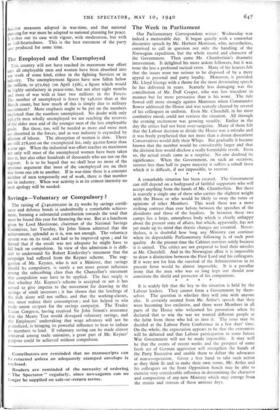The Week in Parliament
Our Parliamentary Correspondent writes : Wednesday was indeed a memorable day. It began quietly with a somewhat discursive speech by Mr. Herbert Morrison, who, nevertheless, contrived to call in question not only the handling of the Norwegian expedition, but the whole record and character of the Government. Then came Mr. Chamberlain's dramatic intervention. It delighted his more ardent followers, but it was none the less a profound tactical error. Many of his hearers felt that the issues were too serious to be disposed of by a mere appeal to personal and party loyalty. Moreover, it provided Mr. Lloyd George with a theme for the most devastating speech he has delivered in years. Scarcely less damaging was the contribution of Mr. Duff Cooper, who was less truculent in manner but far more persuasive than is his wont. The tide flowed still more strongly against Ministers when Commander Bower addressed the House and was scarcely cheered by several of his colleagues in uniform. Even Mr. Churchill, in his most combative mood, could not retrieve the situation. All through the evening excitement was growing steadily. Earlier in the day the critics had not been over-sanguine. Many of them felt that the Labour decision to divide the House was a mistake and it was freely prophesied that not more than a dozen dissentient Conservatives would defy their Whips. But gradually it became known that the number would be considerably larger and that the division lists would disclose a really formidable revolt. Even so, the actual result came as a surprise. No one doubted its significance. When the Government, on such an occasion, secures less than half its paper majority it suffers a rebuff from which it is difficult, if not impossible, to recover.






























 Previous page
Previous page